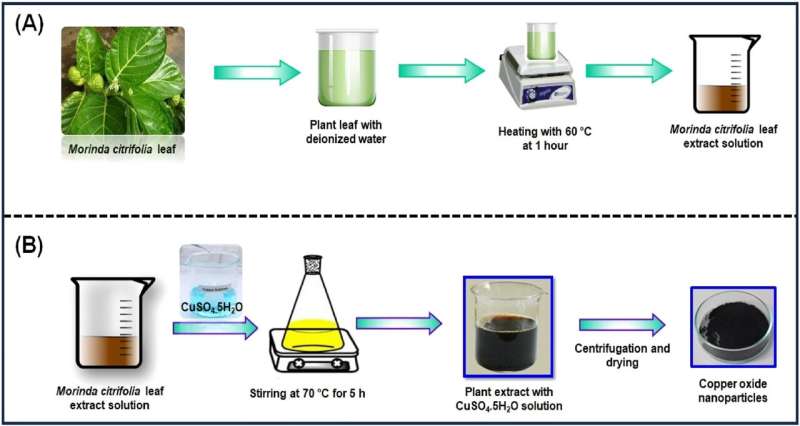
Researchers have described a green method for obtaining copper oxide nanoparticles from the noni plant (Morinda citrifolia), common in Asia. These copper oxide nanoparticles exhibit bactericidal properties. Moreover, antibacterial activity depends on the physical properties of the particles—size, structure, and concentration of copper oxide.
Biochemists are studying various ways to obtain such particles. Chemical and physical methods are known, but they require toxic materials. Therefore, the modern approach is to use biological methods, that is, obtaining nanoparticles from plants, bacteria, or fungi.
A RUDN Unviersity biotechnologist and colleagues from India, Korea, and Saudi Arabia have found a green method for producing copper oxide nanoparticles, and their findings are published in the journal Scientific Reports.
“Copper oxide nanoparticles are of interest in many areas of science. Biosynthetic nanoparticles are produced through biological processes from bacteria, fungi, or plant extracts. The importance of such nanoparticles lies in their potential for sustainable, effective, and biocompatible solutions in health care and environmental protection, as well as in materials science and energy,” said Alexandre Vetcher, Ph.D., Deputy Director of the Nanotechnology Center at RUDN University.
Noni grows in the South Pacific region. It is a tall plant with edible fruits. Biologists took an extract of noni leaves and mixed it with an aqueous solution of copper sulfate. A catalyst, sodium hydroxide, was also used. The role of noni extract in this process is the stabilization of nanoparticles. The resulting nanoparticles were tested for activity against gram-positive and gram-negative bacteria, as well as against fungi. The antimicrobial effect was compared with the broad-spectrum antibiotic chloramphenicol.
The result was stable spherical copper oxide nanoparticles ranging in size from 20 to 50 nanometers. They were active against Bacillus subtilis, Escherichia coli, Staphylococcus aureus, and three types of fungi (Aspergillus flavus, Aspergillus niger, and Penicillium frequentans). Particles obtained from solutions in which the concentration of noni extract was 25 microliters showed better results, comparable to chloramphenicol.
“The resulting copper oxide nanoparticles can be used in biomedicine, the production of fuel cells, batteries, and food storage. However, more research is needed to minimize toxicity while maintaining their biological effectiveness. This will contribute to the biomedical use of particles,” noted Dr. Vetcher.
More information:
Manogar Priya et al, Green synthesis, characterization, antibacterial, and antifungal activity of copper oxide nanoparticles derived from Morinda citrifolia leaf extract, Scientific Reports (2023). DOI: 10.1038/s41598-023-46002-5
Citation:
Scientists develop green method for producing bactericidal copper oxide nanoparticles from noni plant (2024, January 10)
retrieved 10 January 2024
from https://phys.org/news/2024-01-scientists-green-method-bactericidal-copper.html
This document is subject to copyright. Apart from any fair dealing for the purpose of private study or research, no
part may be reproduced without the written permission. The content is provided for information purposes only.







